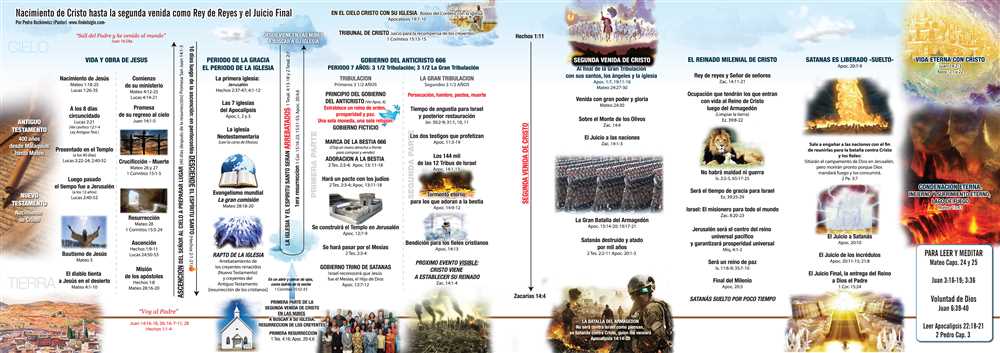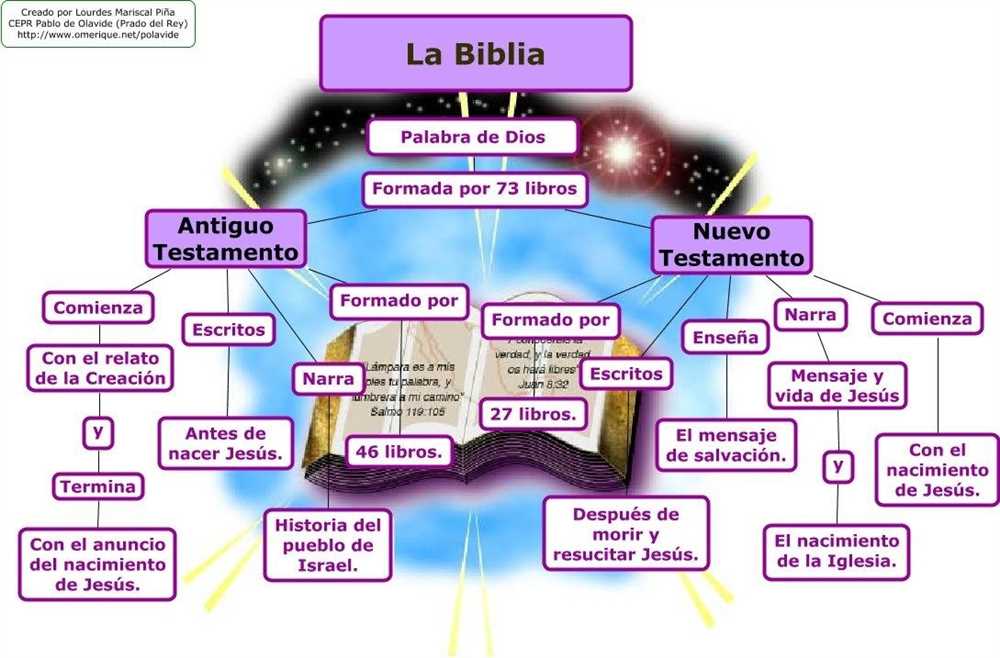
El Nuevo Testamento es una parte fundamental de la Biblia Cristiana y contiene una amplia variedad de enseñanzas y relatos sobre la Iglesia. La Iglesia en el Nuevo Testamento se presenta como una comunidad de creyentes que se reúnen para adorar a Dios y vivir de acuerdo con los principios del Evangelio.
En el Nuevo Testamento, Jesús es presentado como el fundador y líder de la Iglesia. Él estableció la Iglesia con sus apóstoles y les dio la autoridad para enseñar y difundir su mensaje. La Iglesia es vista como el cuerpo de Cristo, con Jesús como la cabeza y los creyentes como los miembros.
El Nuevo Testamento también enseña que la Iglesia es el lugar donde se experimenta la presencia del Espíritu Santo. El Espíritu Santo es enviado por Dios para capacitar a los creyentes y guiarlos en su vida espiritual. En la Iglesia, los creyentes son animados y fortalecidos por el Espíritu Santo para vivir una vida santa y obedecer los mandamientos de Dios.
Foundation of the Christian Church

The foundation of the Christian Church can be traced back to the ministry of Jesus Christ during his time on earth. Jesus selected twelve disciples to be his closest followers and entrusted them with the task of spreading his teachings to the world. These twelve disciples became the foundation of the Church, as they were the ones who witnessed his miracles, listened to his teachings, and experienced his resurrection.
After Jesus’ death and resurrection, the disciples continued to fulfill their mission by proclaiming the message of salvation and establishing communities of believers. The Day of Pentecost, which marked the coming of the Holy Spirit, was a significant event in the early Church’s foundation. On that day, the disciples were filled with the Holy Spirit and began speaking in different languages, enabling them to communicate with people from various regions and nations.
The early Christian Church grew rapidly, with believers coming together in worship, fellowship, and the breaking of bread. They devoted themselves to the apostles’ teaching, shared everything they had, and cared for one another. The apostles appointed leaders within the Church, such as elders and deacons, to ensure order and unity among the believers.
- Jesus selected twelve disciples to be the foundation of the Church.
- The Day of Pentecost marked the coming of the Holy Spirit and empowered the disciples to spread the message of salvation.
- The early Christian Church grew rapidly through worship, fellowship, and caring for one another.
- Leadership positions, such as elders and deacons, were established within the Church for order and unity.
The foundation of the Christian Church laid by Jesus and his disciples continues to be the cornerstone of the faith today. Through their obedience and dedication, the Church has grown and spread across the world, adapting to different cultures and times while remaining faithful to its core teachings. The foundation of the Church serves as a reminder of the transformative power of Jesus’ ministry and the ongoing mission of sharing the Gospel with all nations.
Organización y liderazgo de la iglesia en el nuevo testamento
La organización y liderazgo de la iglesia en el nuevo testamento se basa en el modelo establecido por Jesucristo y sus apóstoles. En este modelo, Jesús es reconocido como la cabeza de la iglesia y los líderes son llamados a servir al pueblo de Dios.
En el nuevo testamento, se mencionan varios roles de liderazgo en la iglesia. Uno de estos roles es el de los apóstoles, quienes fueron elegidos directamente por Jesús para liderar y enseñar a los primeros creyentes. Otro rol importante es el de los ancianos, quienes son mencionados varias veces en los escritos de Pablo y se encargaban de la supervisión y el cuidado pastoral de las iglesias locales.
Además de los apóstoles y los ancianos, el nuevo testamento también menciona otros roles de liderazgo, como los diáconos, que se encargaban de servir y cuidar de las necesidades prácticas de la iglesia. Estos roles de liderazgo eran vistos como un ministerio y una responsabilidad sagrada, y los líderes eran llamados a vivir de acuerdo con los principios de la fe cristiana y a guiar a la iglesia en el camino de la obediencia a Dios.
En cuanto a la organización de la iglesia, el nuevo testamento muestra que las iglesias locales se reunían regularmente para adorar juntos, recibir enseñanza y participar en la comunión. Se animaba a los creyentes a mantener la unidad y el amor unos hacia otros, y a buscar la guía del Espíritu Santo en la toma de decisiones importantes para la iglesia.
En resumen, la organización y liderazgo de la iglesia en el nuevo testamento se basaba en el modelo establecido por Jesucristo y sus apóstoles. Los líderes eran llamados a servir al pueblo de Dios y vivir de acuerdo con los principios de la fe cristiana. Las iglesias se organizaban en función de roles de liderazgo, como los apóstoles, los ancianos y los diáconos, y se reunían regularmente para adorar, recibir enseñanza y buscar la guía del Espíritu Santo.
The Role of the Apostles in the Early Church
In the early church, the apostles played a crucial role in establishing and guiding the newly formed Christian communities. They were chosen and commissioned by Jesus himself to be his witnesses and to spread the message of the gospel to all nations. As such, they held a position of authority and leadership within the church.
The apostles were responsible for laying the foundation of the church, both doctrinally and practically. They were imbued with the authority to teach and interpret the teachings of Jesus, ensuring that the gospel message remained pure and untainted. They were also instrumental in establishing the early church’s organizational structure, appointing elders and leaders, and ordaining ministers to carry out the work of the ministry.
The apostles were not only entrusted with the spiritual guidance of the church but also with the task of spreading the gospel to the ends of the earth. They were the pioneers of the early missionary movement, traveling extensively and proclaiming the message of salvation to both Jews and Gentiles. Their firsthand experiences with Jesus and their witness of his resurrection gave them a unique authority and credibility, which enabled them to effectively proclaim the gospel and perform miracles in his name.
The apostles also played a key role in resolving doctrinal disputes and maintaining the unity of the church. They convened councils and wrote letters to address theological issues and provide instruction to the various local churches. Their role as authoritative figures helped to prevent heresy and maintain orthodoxy within the early Christian communities.
In summary, the apostles were instrumental in the establishment, guidance, and growth of the early church. They held a position of authority and leadership, ensuring the purity of the gospel message, overseeing the organization of the church, and spreading the message of salvation to all nations. Their role in the early church laid the foundation for the development and expansion of Christianity throughout the centuries.
Worship and Teaching in the New Testament Church
In the New Testament, the early Christian church placed a strong emphasis on both worship and teaching. These two components were integral to the life of the church and were considered essential for the growth and development of believers.
Worship: Worship in the New Testament church was a central aspect of their corporate gatherings. Believers came together to offer praise and adoration to God, recognizing His sovereignty and expressing their love and gratitude. Worship was characterized by the singing of hymns and psalms, prayer, and the sharing of spiritual gifts. It was a time of unity and spiritual communion, where believers encouraged one another and built each other up in faith.
Teaching: Teaching in the New Testament church was crucial for the spiritual growth and maturation of believers. The apostles and other leaders were responsible for instructing the congregation in the teachings of Jesus Christ. They taught about the kingdom of God, the importance of love and unity among believers, and the significance of living a holy and righteous life. The teaching was often done through sermons, parables, and the reading and explanation of Scripture. It aimed to equip believers with the knowledge and understanding they needed to live out their faith in a practical and impactful way.
In conclusion, worship and teaching were essential components of the New Testament church. Through worship, believers expressed their love and adoration to God, while teaching provided them with the necessary knowledge and understanding to live out their faith. These practices continue to be integral to the life of the church today, as they help believers grow in their relationship with God and impact their communities for His glory.
The Church as the Body of Christ
In the New Testament, the church is often referred to as the “body of Christ.” This metaphor highlights the intimate connection between Christ and the members of the church. Just as the human body is made up of different parts that work together to function as a whole, so too the church is made up of diverse individuals who are united in their shared faith in Christ.
Paul, in his letters to the Corinthians and Ephesians, elaborates on the concept of the church as the body of Christ. He emphasizes the importance of each member’s unique contribution and the unity that is created through their collaboration. Each believer has been given different spiritual gifts, talents, and abilities, and these are to be used for the edification and growth of the church as a whole.
Just as the human body cannot function properly if one part is missing or not functioning as it should, so too the church requires the active participation of all its members. Every individual has a vital role to play in the body of Christ, and their absence or neglect of their responsibilities can have a detrimental effect on the overall health and effectiveness of the church.
As the body of Christ, the church is called to reflect the character of Christ and carry out his mission in the world. This includes proclaiming the gospel, serving others, and demonstrating love and compassion. When the members of the church work together, utilizing their unique gifts and talents, they can have a powerful impact on their communities and bring about transformation and change.
The Church as a Community of Believers
The church in the New Testament is often referred to as a community of believers, a group of people who have come together in their faith in Jesus Christ. It is a group characterized by their belief in the gospel, their love for one another, and their commitment to follow the teachings of Christ.
One of the key aspects of the church as a community of believers is the idea of unity. In the New Testament, the church is described as a body, with each member playing a unique role and contributing to the overall health and growth of the body. This unity is based on their common faith in Christ and their shared mission to spread the gospel.
Another important aspect of the church as a community of believers is the idea of fellowship. The New Testament emphasizes the importance of believers gathering together for worship, teaching, and mutual encouragement. This fellowship is not just a social gathering, but a time of spiritual growth and accountability.
The church as a community of believers is also characterized by their love for one another. In the New Testament, believers are instructed to love one another as Christ loved them. This love is not just a feeling, but a sacrificial love that seeks the well-being and spiritual growth of others.
In conclusion, the church in the New Testament is a community of believers who are united in their faith in Christ, committed to following his teachings, and dedicated to loving one another. This community is characterized by their unity, fellowship, and love for one another. As believers, we are called to be active participants in this community, contributing our unique gifts and talents for the benefit of the body of Christ.
La iglesia y la misión cristiana
La iglesia en el Nuevo Testamento tiene una clara misión cristiana: llevar el mensaje del evangelio a todas las naciones y hacer discípulos de Jesucristo. Esta misión es el corazón mismo de la identidad y propósito de la iglesia.
La misión cristiana se basa en el mandato dado por Jesús a sus discípulos antes de ascender al cielo. En Mateo 28:19-20, Jesús les dijo: “Id, pues, y haced discípulos de todas las naciones, bautizándolos en el nombre del Padre y del Hijo y del Espíritu Santo, enseñándoles a cumplir todo lo que os he mandado”. Este mandato es la base de la misión cristiana y la iglesia tiene la responsabilidad de llevar a cabo esta tarea en obediencia a Cristo.
Para cumplir con la misión cristiana, la iglesia debe ser una comunidad de creyentes comprometidos con el mensaje del evangelio y el discipulado. Esto implica compartir el mensaje de salvación a través de la predicación, el testimonio personal y el servicio a los demás. La iglesia también debe enseñar a los nuevos creyentes a obedecer los mandamientos de Jesús y crecer en su fe, proporcionando enseñanza bíblica y oportunidades para la adoración y la comunión.
La misión cristiana no se limita a un lugar específico o a un grupo de personas. Es una misión global que abarca todas las naciones y culturas. La iglesia en el Nuevo Testamento ejemplifica esto a través de la expansión del evangelio a diferentes regiones del mundo conocido en ese tiempo, como se registra en los Hechos de los Apóstoles. La iglesia moderna también debe seguir este ejemplo y estar comprometida con la misión global, llevando el mensaje de salvación a aquellos que aún no lo han oído.
En resumen, la iglesia en el Nuevo Testamento tiene la misión cristiana de llevar el mensaje del evangelio a todas las naciones y hacer discípulos de Jesucristo. Esta misión se basa en el mandato dado por Jesús a sus discípulos y requiere una comunidad de creyentes comprometidos con el mensaje del evangelio y el discipulado. La misión cristiana es global en su alcance y la iglesia debe estar comprometida con llevar el mensaje de salvación a aquellos que aún no lo han oído.
La iglesia en la era presente y futura

La iglesia en el Nuevo Testamento es vista como el cuerpo de Cristo, compuesta por creyentes que han sido redimidos por la sangre de Jesús. Estos creyentes son llamados a vivir en comunidad, compartiendo sus talentos y recursos para el avance del Reino de Dios. La iglesia tiene la responsabilidad de proclamar el evangelio y hacer discípulos de todas las naciones.
En la era presente, la iglesia enfrenta desafíos y persecuciones, pero también experimenta la manifestación del Espíritu Santo y la gracia de Dios. Los creyentes son exhortados a vivir en santidad y amor, sirviendo y edificando el cuerpo de Cristo. La iglesia presente busca ser una luz en medio de la oscuridad, extendiendo el amor de Dios a aquellos que no lo conocen.
En la era futura, la iglesia será llevada a la presencia de Cristo, donde disfrutará de la comunión eterna con Dios y los santos. Se nos promete un nuevo cielo y una nueva tierra, donde no habrá más dolor ni sufrimiento. La iglesia tendrá un lugar especial en el reino de Dios, y reinará junto con Cristo por toda la eternidad.
Como miembros de la iglesia en esta era presente, debemos tener en mente la importancia de vivir en obediencia a la Palabra de Dios y buscar la comunión con otros creyentes. Debemos ser una iglesia vibrante y activa, llevando el mensaje de salvación a todas las personas y siendo testigos del amor transformador de Jesús. Mientras esperamos la gloria futura, debemos ser fieles en nuestro servicio y nuestra adoración a Dios.